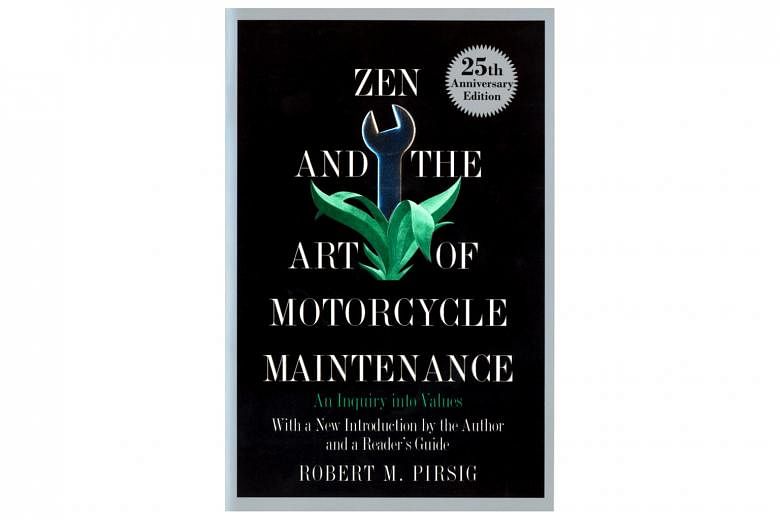NEW YORK• • Robert M. Pirsig, whose Zen And The Art Of Motorcycle Maintenance, a dense and discursive novel of ideas, became an unlikely publishing phenomenon in the mid-1970s and a touchstone in the waning days of the counterculture, died on Monday at his home in South Berwick, Maine. He was 88.
His publisher, William Morrow, announced his death, saying his health had been failing. He had been living in Maine, in the United States, for the last 30 years.
Pirsig was a college writing instructor and freelance technical writer when the novel - its full title was Zen And The Art Of Motorcycle Maintenance: An Inquiry Into Values - was published in 1974 to critical acclaim and explosive popularity, selling one million copies in its first year and several million more since.
(A first novel, it would be followed by only one more, the less successful Lila: An Inquiry Into Morals, a kind of sequel, in 1991.)
The novel, with its peculiar, but intriguing title, ranged widely in its concerns, contemplating the relationship of humans and machines, madness and the roots of culture.
Pirsig's plunge into the grand philosophical questions of Western culture remained near the top of the bestseller lists for a decade and helped define the post-hippie 1970s landscape as resoundingly, some critics have said, as Carlos Castaneda's The Teachings Of Don Juan helped define the 1960s.
Where Don Juan pursued enlightenment in hallucinogenic experience, Zen argued for its equal availability in the brain-racking rigours of Reason with a capital R.
Years after its publication, it continues to be invoked by famous people when asked to name a book that affected them most deeply - among them former professional basketball player Phil Jackson, actors William Shatner and Tim Allen, and Turkish novelist Orhan Pamuk, a Nobel laureate.
Part road-trip novel, part treatise, part open letter to a younger generation, Zen And The Art Of Motorcycle Maintenance unfolds as a fictionalised account of a cross- country motorcycle trip that Pirsig took in 1968 with his 11-year-old son, Christopher, and two friends.
The narrative alternates between travelogue-like accounts of their 17 days on the road, from the Pirsigs' home in Minnesota to the Pacific Coast, and long interior monologues he calls his "Chautauquas", after the open-air educational meetings at Lake Chautauqua, New York, popular with self-improvers since the 19th century.
Pirsig's narrator (his barely disguised stand-in) focuses on what he sees as two profound schisms. The first lay in the 1960s culture war, in which the "hippies" rejected industrialisation and the technological values that had been embraced by the "straight" mainstream society.
The second schism is in the narrator's own mind as he struggles in his hyper-rational way to understand his recent mental breakdown.
Pirsig, who was told he had schizophrenia in the early 1960s, said writing the book was partly an effort to make peace with himself after two years of hospital treatments, including electric shock therapy, and the turmoil that he, his wife and children suffered as a result.
(Pirsig's son Christopher was later also found to be mentally ill and institutionalised. He died in 1979 after being stabbed in a mugging outside the San Francisco Zen centre where he had been living.)
In a foreword to the book, Pirsig told readers that despite its title, Zen And The Art Of Motorcycle Maintenance should "in no way be associated with that great body of factual information relating to orthodox Zen Buddhist practice".
He added: "It's not very factual on motorcycles either." Instead, he wrote later: "The motorcycle is mainly a mental phenomenon. People who have never worked with steel have trouble seeing this... A study of the art of motorcycle maintenance is really a miniature study of the art of rationality itself."
Literary critic George Steiner, writing in The New Yorker, described the book as "a profound, if somewhat clunky, articulation of the postwar American experience" and pronounced it worthy of comparison to Moby Dick as an original American work.
(Not all reviewers were wowed. Writing in Commentary, writer-academic Eva Hoffman found Pirsig's ruminations obtuse. "Beneath the complexity of disorganisation," she said, "the picture of society which the book presents and the panaceas it offers are distressingly naive.")
One of Pirsig's central ideas is that so-called ordinary experience and so-called transcendent experience are actually one and the same - and that Westerners imagine them as separate realms only because Plato, Aristotle and other early philosophers came to believe that they were.
NYTIMES

